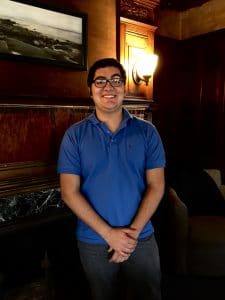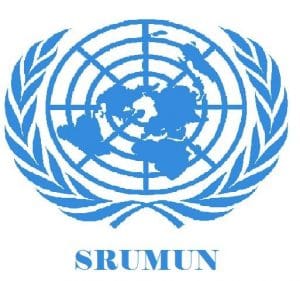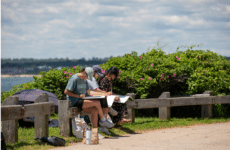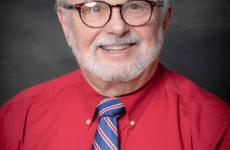By Hannah Lussier | Staff Writer
After 5 years of inactivity, Salve Regina’s Model United Nations club is making a comeback. Model United Nations, also known as MUN, is a club recognized worldwide which engages students in  a competitive academic environment in order to develop their public-speaking and research skills. Since his freshman year, club president, Sebastian Taborda, has been working diligently in order to revive the club so that Salve’s students can “learn to engage with people” and think more critically about the world around them.
a competitive academic environment in order to develop their public-speaking and research skills. Since his freshman year, club president, Sebastian Taborda, has been working diligently in order to revive the club so that Salve’s students can “learn to engage with people” and think more critically about the world around them.
In a process which he claims was challenging, Taborda has rebuilt the club from the ground up and is excited to announce that Salve’s newly elected delegation will make its public debut in competition at a Brown University conference this weekend.
Taborda fell in love with MUN as a delegate at his high school, but he was not surprised to find that Salve did not have its own group when he arrived as a part of the class of 2018 last year. He says that “in small schools, these kind of clubs are hard to come by since they need a very specific type of people” in order to function at a high level. Previously, Salve had a Model UN but as the years went by interest faded and the club went dark.
Taborda believes that for an academics-based club like MUN to remain active, its members must be committed and responsible. He says that it is difficult to compete with other schools if students do not feel passionate about debate and research. So, in order to form a strong delegation, Taborda interviewed candidates through a process which included speech-making.
The speeches were meant to demonstrate a candidate’s public speaking skills as well as their ability to research accurately and effectively. Taborda has selected a group of four: Santiago Durango, Ryan Ciocco, Kayla Rennie and Heidi Silverio who will accompany him in competition at Brown this coming weekend.
In a typical competition, students are organized by committee and are assigned a political, social or economic issue to debate from the perspective of different UN member countries. The format allows students to develop presentation, collaboration and critical thinking skills which will help them in their future careers.
According to Taborda, Brown’s competition is somewhat unique in that it allows delegates to act as individuals and typically engages them with historic issues only. At other competitions, Taborda has debated about contemporary scenarios, futuristic scenarios as well as hypothetical scenarios.
One topic which he is particularly interested in engaging with at Brown discusses developments in the automobile industry between the companies Tesla and Toyota. Taborda says that above all, the fun in competing is “in the connections you make” whether it is “future connections for work or friendships”.
Sebastian Taborda’s revival of the Model United Nations at Salve does not only stem from his dream to one day become a diplomat, but is also a function of his desire to give to the Salve community. He says “I hope to work for the UN at some point” but “I like to give something [back] to Salve…that is the best way I can contribute”.
In the future, Taborda wishes to bring fellow “MUNers” to speak at Salve and hopes that one day the university will be able to host its own conference. Taborda says that Model United Nations “really challenges you to do everything that you have to do when you become an adult” and hopes that the Salve community will participate more once they “realize how good MUN would be for them”.














